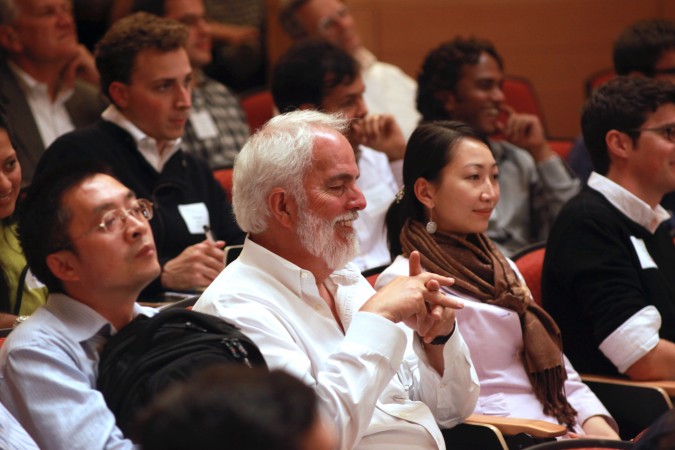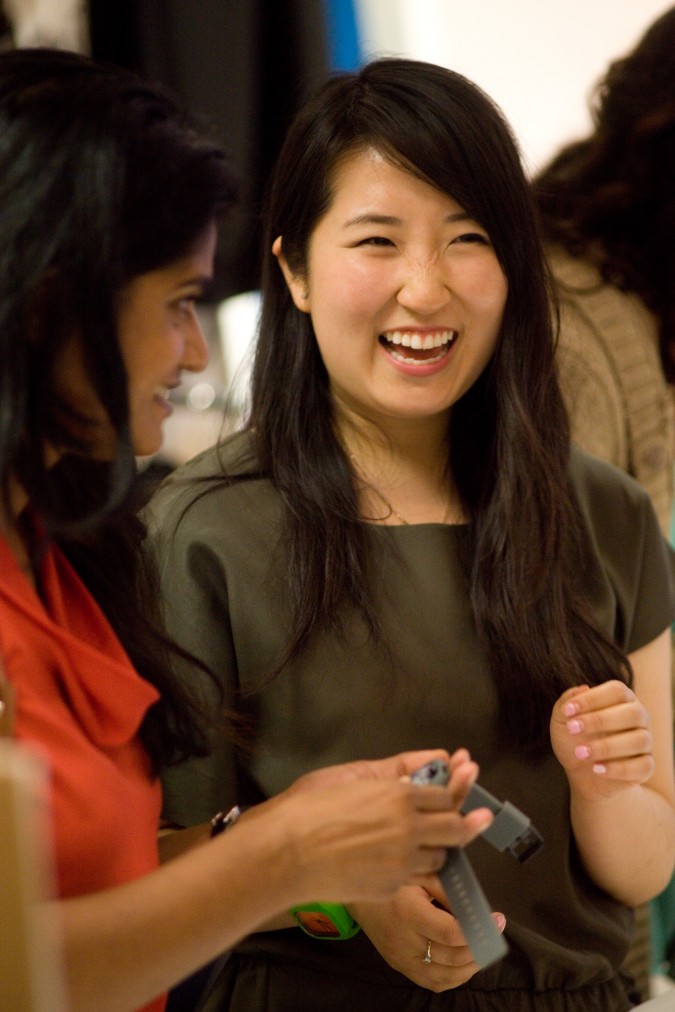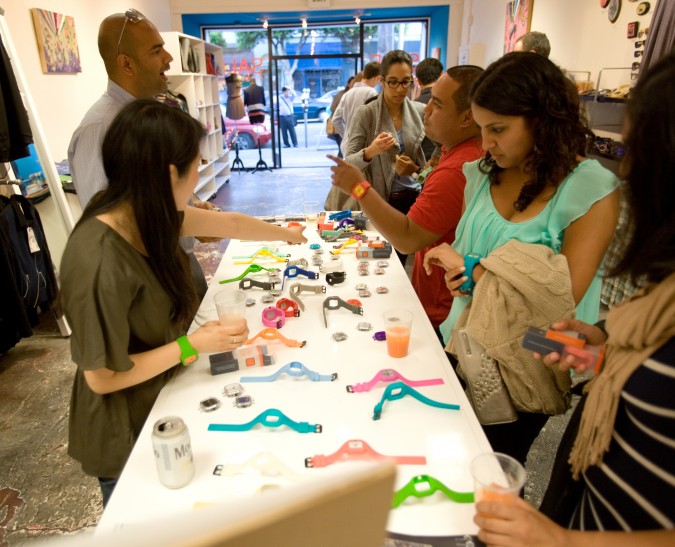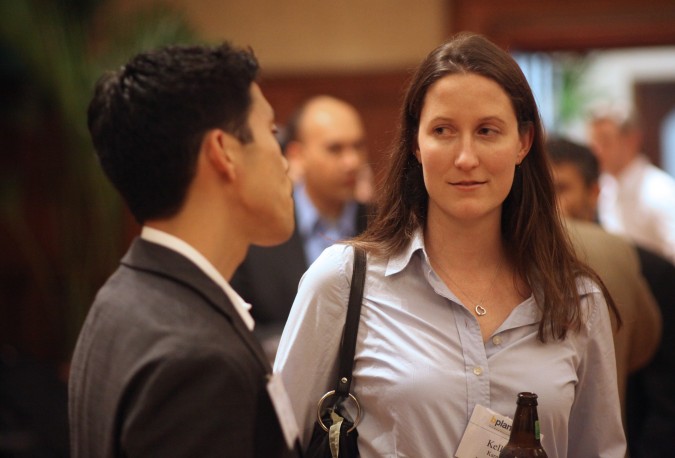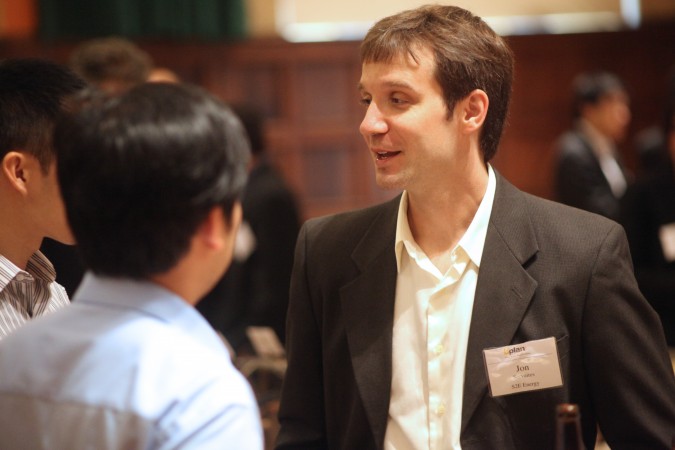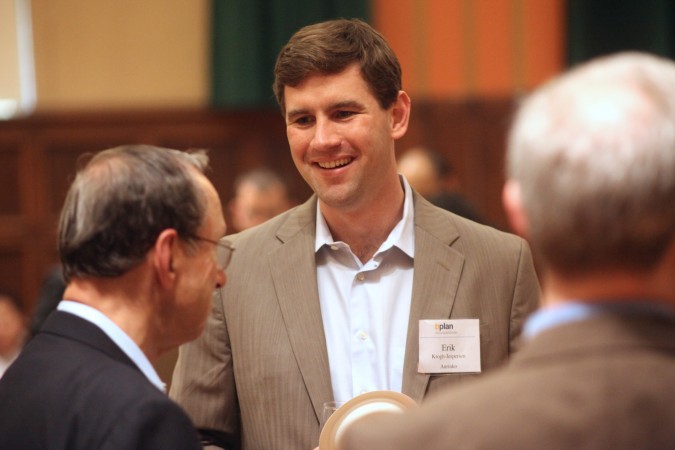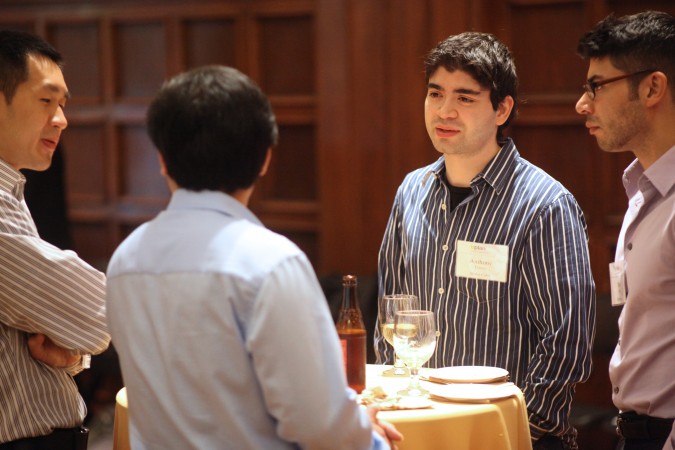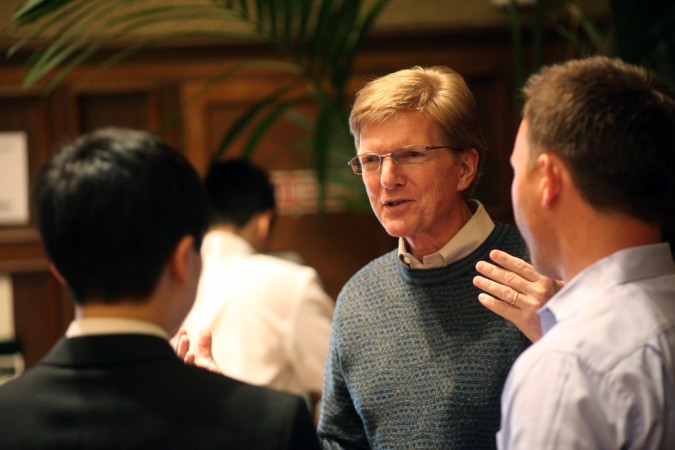Archive for the ‘The Lester Center for Entrepreneurship’ tag
Berkeley Entrepreneurs Forum, 2012-13 Angel & Venture Capital Financing Overview – August 30, 2012
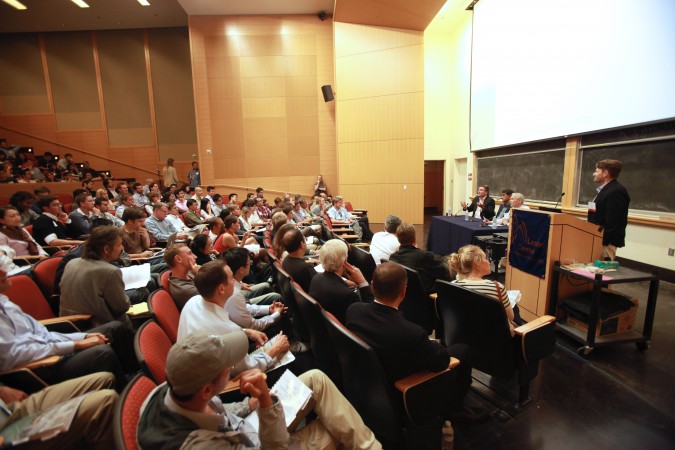
The Berkeley Entrepreneurs Forum, August 30, 2012, held at Stanley Hall, room 105, because Anderson Auditorium was booked
On August 30, 2012 I attended the 2012-13 Angel & Venture Capital Financing Overview at The Berkeley Entrepreneurs Forum.
The August 30th Forum was the first of this academic year. The Berkeley Entrepreneurs Forum is a production of The Lester Center for Entrepreneurship & Innovation at the Haas School of Business at the University of California Berkeley.
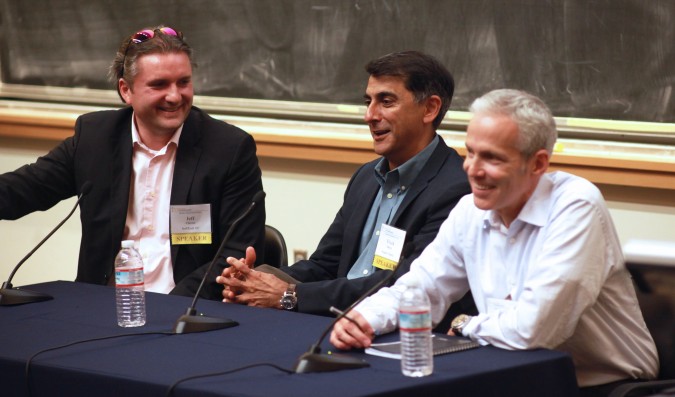
Panelists Jeff Clavier, Vivek Mehra and Jim Barnett at Berkeley Entrepreneurs Forum, August 30, 2012. Photo by Kevin Warnock.
The first Forum of the year for years now starts with Steve Bengston’s presentation of the Shaking the Money Tree report. I suspect Bengston has made this presentation hundreds of times, as he gives it not just at the Forum, but at many venues. In fact, I suspect it’s Bengston’s signature talk.
You can watch the full video of the Forum here to see what happened. I am a photographer, not a videographer. This is not the official video, which The Lester Center will publish in its entirety some weeks from now, I believe. I suggest you watch that version, because it will have professional sound from a mixing board, the slides will likely be full screen so you can read them, and the camera used is far better than the still camera I used that happens to also shoot video. I did not upload this video at full quality, since such video takes far longer to compress for Internet display.
There were some good lines from the speakers. I’ve transcribed my favorites here:
Steve Bengston:
“It [venture capital] finally got big in the mid to late 90s and now we worry when the venture business goes from $30B to $20B, but it never got above $20B until 1998 so the scale of the venture business is just much bigger than it’s ever been.”
“What about Series A, ‘didn’t that collapse?’ It is down certainly from the peak but you can see whatever that is there are $200M to $400M of series A deals each quarter just in Silicon Valley and that represents about 50 to about a 100 Series A deals in Silicon Valley each quarter.”
“The good news is there is a lot of money for your deal if you meet the certain metrics for an investor.”
“If you’re going to raise money which is still hard to do, you’re going to raise around $3M. That’s a typical deal. In this era, that buys you a lot more months of burn than it would have say ten years ago.”
“You have 300 to 400 M & A exits in the US a year in the US, much higher than the old days.”
“The top five or so [venture] firms are raising 80% of the money.”
“It begs the question ‘How many VCs do you need to find the 30 good companies every year?’ Right now the answer is about 3,000. For many people that seems high.”
“China has been the number one economy 15 of the last 18 centuries. So, just because they have had a couple of bad centuries you don’t want to count them out. They are used to being on top.”
Jeff Clavier:
“The challenge at the early stage is that even great founders can come up with really stupid ideas.”
“Do it because you are passionate about it, not because it’s cool.”
“I passed on airbnb that some showed me when it was called air bed and breakfast and I said ‘air bed and breakfast… are you f—ing kidding me?'”
Jim Barnett:
“One of the danger signs that all the partners look for is what we call ‘complexifiers’ — people that take what is otherwise a relatively simple business proposition or business idea and figure out how to make it complex.”
“The one thing I would say to those thinking about starting a company or planning to start a company is just go do it. Your idea really doesn’t need to be that great. It really doesn’t. If you’re great, it will get funded.”
“I want to dispell a myth that you learn more from your mistakes than you do from your successes. I think that is just a bunch of crap. I really do. I think you learn from watching success — pattern matching, whether it’s in sports whether it’s in business or anything else so for those of you that are in the audience that are MBAs or that are undergrads that are thinking about what do if they’re not going to start a company I would say ‘go work for a successful company and watch.’ You’ll learn a lot more than doing three failed startups.”
Vivek Mehra:
“I hate doing deals over the weekend. I have never done one and I hope I never have to do one. It’s just impossible to get to know the entrepreneur.”
“When there are very asymmetric equity assignments amongst the team you know what they really think about each other.”
Here is my succinct summary of this Entrepreneurs Forum:
- The venture industry is in trouble, but there is still plenty of money around.
- Lots of angel investors are making what will prove to be poor investments so this increases the chances that you can raise money even if you or your idea are not that good.
- There is a lot to be gained by just starting a company, so if you are passionate about doing so, then go for it. You won’t ruin your chances for future success by failing a few times.
- However, if you’re not going to start a company, you should work for a clearly successful company so you can pay attention and learn from the success of others.
- Surround yourself with high quality people.
- Don’t make things more complicated than they need to be.
- Have your role worked out with your founders before you pitch to investors. Lopsided equity divisions speak loudly to investors what you think of your co-founders.
- Increase your chances of getting funded by persistently pursuing entrepreneurship over years, so investors may gauge your actions over your words.
- Work hard and recognize that a lot of success may be attributed to your ability to forge healthy and respectful long term relationships with people in the community.
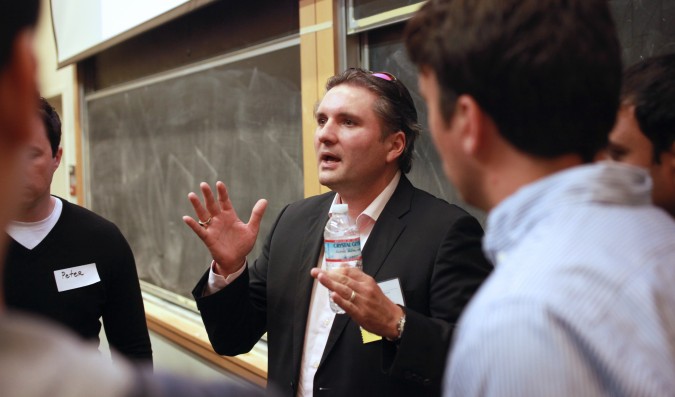
Panelist Jeff Clavier answers questions at the Berkeley Entrepreneurs Forum, August 30, 2012. Photo by Kevin Warnock.
From the Berkeley Entrepreneurs Forum website, here are the introductions for the moderator and speakers — I added the hyperlinks to make it easier for you to learn more about the panelists and their many interests:
Samuel B. Angus
Partner
Fenwick & West LLP
Samuel B. Angus is a partner in the Corporate and Venture Capital Group of Fenwick & West LLP, a law firm specializing in technology and life sciences matters. Mr. Angus is resident in the San Francisco office and his practice concentrates on advising start-up/venture-backed companies, venture capital and debt financings, mergers and acquisitions, intellectual property licensing, joint ventures and general corporate matters. Mr. Angus represents a broad range of companies from privately held start-up companies to publicly traded corporations, including Airbnb, Github, Marin Software and oDesk. His practice also includes advising entrepreneurs and investors.
Jim Barnett
Partner
Shasta Ventures
Jim Barnett is a Partner at Shasta Ventures and has been a highly successful serial CEO and entrepreneur. Jim is currently chairman and co-founder of Turn, chairman of Extole and Sojern, and a board member of Needle and RelayRides. From 2004 until 2009, Jim was CEO, chairman and co-founder of Turn, the leading platform for managing data driven digital advertising. Before that he was president of Overture Search, a division of Overture Services, Inc. Jim joined Overture via its acquisition of AltaVista Company, where he was president and CEO. In this role, he led the company’s successful turnaround and sale to Overture.
Jim was also president of Ancestry.com (MyFamily.com) and president and CEO of ThirdAge Media, which was acquired by Ancestry.com. Prior to that, Jim was president and CEO of Infogrammes North America, a leading global publisher of video games and entertainment software. He was also chairman, president and CEO of Accolade Inc, Infogrammes’ predecessor company, and prior to that was chief operating officer of an “Inc. 100 Fastest Growing Private Companies.”
Jim has served on the boards of many private and public companies including SideStep, Inc. where he was chairman and Petco where he was also an early investor. Jim earned a bachelor’s degree, MBA and J.D. from Stanford University.
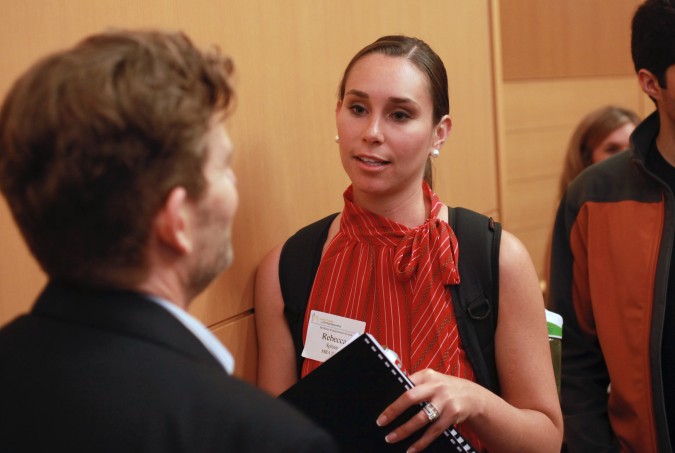
Moderator Sam Angus listens to student Rebecca Spitzer pitch her startup at the Berkeley Entrepreneurs Forum, August 30, 2012
Steve Bengston
PricewaterhouseCoopers
Steve Bengston heads the Emerging Company Services (ECS) group at PricewaterhouseCoopers. ECS acts as “mentor capitalists” for young, high potential companies.
Before joining PwC, Steve had 20 years of experience in a variety of marketing, business development and general management roles at several high tech companies in the Bay Area. Most recently, he was Pres/CEO of ynot.com [Note: not the website now online at that URL], a leading international emarketing and greeting card company. Previously, he was VP Marketing & Business Development at Worldview Systems, an Internet travel pioneer. At Worldview, Steve helped launch and market Travelocity with Sabre Interactive.
Steve has a BA in Economics and MBA from Stanford University. He works closely or sits on the Advisory Board at Churchill Club, SVASE, Life Science Angels, Bay Bio, and the Stanford/MIT Venture Lab, has taught classes on startups at UC Berkeley, San Jose State, Santa Clara Law School, Hastings Law School, and Stanford, and is active in a variety of other organizations in the Bay Area targeting entrepreneurs and investors. He is a frequent moderator/panelist at both university and industry sponsored events.
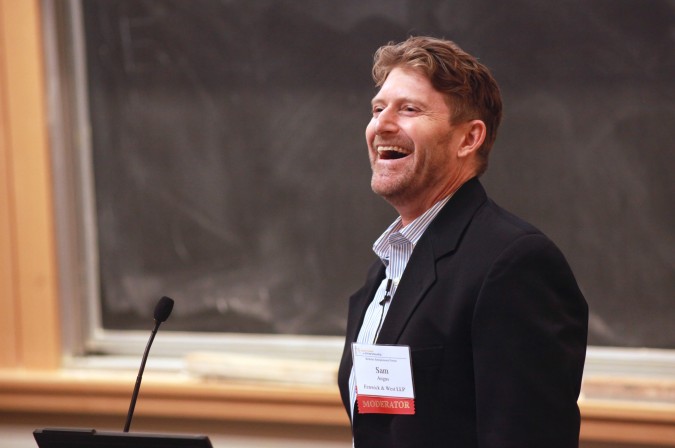
Sam Angus, a partner at law firm Fenwick & West LLP, moderates a panel at the Berkeley Entrepreneurs Forum, August 30, 2012
Jeff Clavier
Founder and Managing Partner
SoftTech VC
Based in Palo Alto, California, Jean-Francois “Jeff” Clavier is the Founder and Managing Partner of SoftTech VC, one of the most active seed stage investors in Web 2.0 startups. Since 2004, Jeff has invested 125 consumer internet startups (Fund I, Fund II, Fund III) in areas like social media, monetization, search, gaming or B2B/B2C web services. These investments are typically located in Silicon Valley, New-York and Boulder. With over 20 years of operational, entrepreneurial and venture capital experience, Jeff is able to add relevant perspective and value to his companies as they grow from inception to maturity, and hopefully, success.
Jeff was recognized as one of the 13 “Web 2.0 King Makers” by (late) Business 2.0. BusinessWeek named him one of “The 25 Most Influential People on the Web” in 2008, and one of the “Top 25 Angels in Tech” in 2010. He was also nominated in the “Best Angel” category at the Crunchies in 2009 and 2010. He is often noted for his investments in categories such as “passion-centric communities” or online gaming, or for having sold a number of his Web 2.0 startups to the likes of Yahoo, AOL, Intuit or more recently PayPal, Twitter and Groupon.
Some of Jeff’s representative investments include Mint (Intuit), Brightroll, Truveo (AOL), Userplane (AOL), Rapleaf, Ustream, Milo (eBay), Blekko, Eventbrite, Tapulous (Disney), DNANexus, FanBridge, BillFloat, Fab, Gigwalk, Byliner and Wildfire.
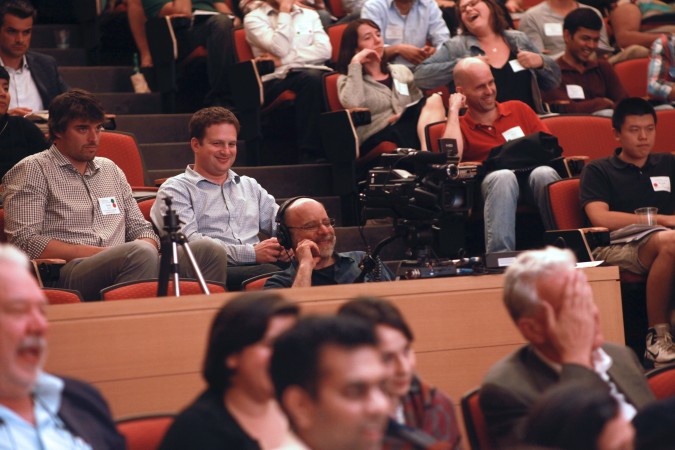
Stuart Sweetow, owner of Audio Video Consultants, capturing video at the Berkeley Entrepreneurs Forum, August 30, 2012
Vivek Mehra
August Capital
Vivek joined August Capital in 2003. He invests broadly in IT infrastructure and areas of interest include data center technologies, systems management, security, storage, and cloud computing systems and software. Prior to joining August Capital, Vivek co-founded Cobalt Networks in 1996. As CTO & VP of Product Development, Vivek built the first successful server appliance and grew Cobalt into a worldwide leader in the category, culminating in a successful IPO and acquisition by Sun Microsystems for $2B. At Sun, Vivek served as the Vice President and General Manager of the Cobalt Business Unit and a member of Sun’s Technical Architecture Council. Prior to founding Cobalt, Vivek held a number of technical and management positions at Apple, SGI, and Digital Equipment Corporation and successfully developed numerous products including Internet enabled set-top boxes, PDAs, RISC workstations, and high performance graphics subsystems.
Vivek received a BS in Electronics from Punjab University, India, and an MS in Computer Engineering from Iowa State University.
To my knowledge, I have been attending The Berkeley Entrepreneurs Forum for longer than anyone else besides Jerry Engel, who founded The Lester Center in 1991 and was its Executive Director for nearly two decades.
I have some suggestions to improve the The Entrepreneurs Forum, which I will describe here. I am posting these suggestions publicly because they are likely applicable to numerous programs across the globe, and I’d like to see these ideas adopted widely if people think they are worthwhile.
1. Dispense with the table panelists sit at. The table doesn’t look good on camera or video, and over time the majority audience for the Forum should be watching online, since the rooms frequently sell out already. Panelists should sit on arm chairs or couches, like they do at most tech conferences that I attend. The moderator should sit with the panelists and not be off to the side standing at a podium. All the people on stage should be outfitted with wireless lapel microphones. I would like the Forum to appear more conversational in style. The table separates the speakers from the audience, where arm chairs suggest a residence for a more intimate vibe.
Here’s an example of a more visually appealing way to run a panel. Steve Bengston is the moderator for this panel at The Churchill Club, where he is a member of its Board of Directors and its past Chair.
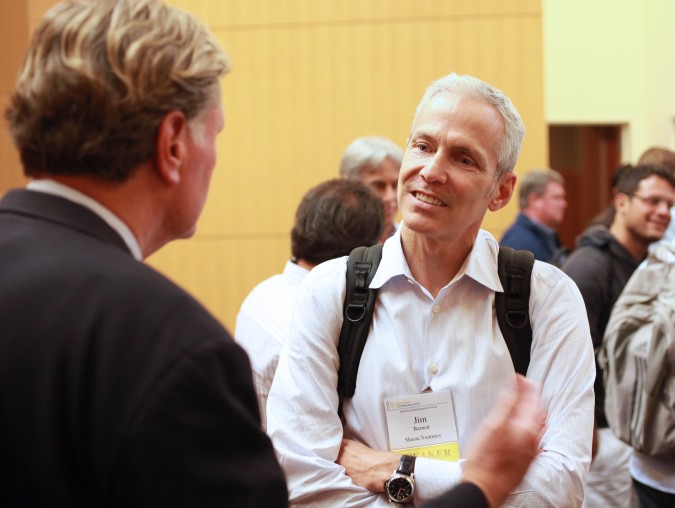
Jeff Burton, the brand new Executive Director of the UC Berkeley Skydeck, talks with Jim Barnett of Shasta Ventures, August 30, 2012
2. Commercial bottled water should be forbidden on stage, even if the speakers bring it with them. Nearly all the conferences I attend serve water from pitchers into real glasses. Bottled water is an evil product, and it looks bad in photographs and video to see those bottles. Image is important, and promoting bottled water by showing it on stage should stop.
3. Commercial bottled water should not be a beverage choice during the networking hour. Tap water should be offered, and it should not require a drink ticket.
4. When it comes time for audience questions, invite the questioner to sit on stage in an arm chair or on the couch while they ask the question and while they are receiving the answer. This will give the questioner time on video, and will permit them to look the speakers in the eye. This will be a treat for the audience members, because they’ll feel they get to ‘meet’ the panelists for 60 or 120 seconds. Questioners can line up to get their turn on stage. Questioners should be encouraged to state their first and last name, so they can be identified online.
5. Although I appreciate that it’s a lot of work, the Forums should be transcribed, and the transcribed text should be posted online. This is a certain way to get more traffic to The Lester Center website, and it’s likely to increase the interest in the Forum from attendees that can’t attend in person.
6. All Forums should be archived online, including Forums from ten and twenty years ago. Forums should never expire and be removed.
7. The ‘numbers’ should be videotaped and included in the online video. The numbers are often the most interesting part of the evening. The contact information for the number presenters should be posted online, with permission of course, and there should be a hyperlink to the project the person is working on.
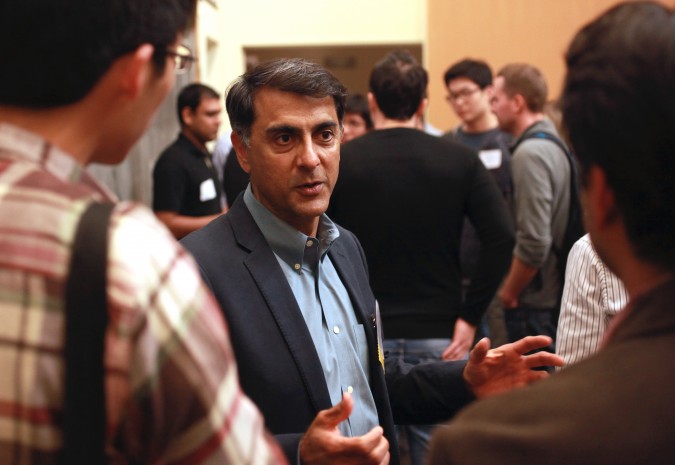
Vivek Mehra, a partner at August Capital, answers questions posed by attendees at the Berkeley Entrepreneurs Forum, August 30, 2012
8. The photographs taken by Bruce Cook, the official photographer, should be publicly posted to Facebook, and should be tagged. Once the identities of the people pictured are known via the tagging, the captions for the official Lester Center website should be updated to identify everyone whose name is known. If required, change the terms of the tickets purchased to give UC Berkeley the right to identify the people by name. Offer an ‘opt out’ list during checkin. Having the names with the pictures will increase traffic to The Lester Center website, since people will search for those names for decades to come. Invite people to tag the pictures in the emails The Lester Center sends out and via Facebook status updates.
9. A vast collection of at least 5,000 of Bruce Cook’s unpublished photographs of the Forum from the last twenty years should be published to Facebook and the Web, and they should be tagged and captioned. This was entirely my idea — Cook did not hint that I propose such an idea. The majority of the pictures published should be of the networking hour, to get as many people from the audiences over the years tagged as possible.
10. The Forum should be oversold, like airplane seats. This August 30th Forum was ‘sold out’ but there were unfilled seats in the auditorium, which takes away from the excitement of a sold out show. If too many people show up, they can watch on video monitors in the Bank of America Forum, and as compensation for not getting a seat, their entrance fee can be 100% refunded. I predict the revenue over time from overbooking will more than make up for the refunds that need to be given. Attendees should be told when they buy their tickets they risk being bumped, and encouraged to arrive early to be sure they get a seat.
11. The reminder to ‘Like’ The Lester Center on Facebook should be repeated on a poster displayed during the Forum. The Forum’s Twitter handle should also be on this poster.
12. Attendees should be given a perk if they follow the Forum on social networks, such as a second drink ticket on their next visit to the Forum, to encourage getting as many followers as possible. Currently attendees may eat unlimited quantities of food at the Forum, but are permitted only one drink, either with alcohol or without.
13. Attendees should be invited to blog and post about the Forums, and The Lester Center site should find and link to the best examples of such efforts, to encourage people to write about the Forum.
I am one of the only bloggers writing about the Forum, but there should be at least several.
14. I love the luxurious food served during the networking hour, but it sure seems like it must cost a fortune. I think it would be more than fine to switch to less fancy food. There is precedent for this. Last year at the Founder School Demo Day what appeared to be inexpensive sandwiches were served, but the event was superb and not diminished by the more everyday food. I suspect the food budget for the Forum could be cut by two thirds without getting more than a handful of complaints. The Forum is still too expensive at USD $25 a ticket, and I bet it loses money even at that price. When I started attending in my mid twenties, the cost was prohibitive. It was only due to my getting free tickets from my employer at the time, Cooley, that I attended regularly. The goal should be to get lots of currently poor entrepreneurs in the making to attend, including but not limited to Berkeley students.
I suggest the price should be no more than $10. To get the price that low, I suggest alcohol should cost extra.
That is all my suggestions for now. The Forum is already a success, or I would not have attended for twenty years. I am trying to make the Forum better.
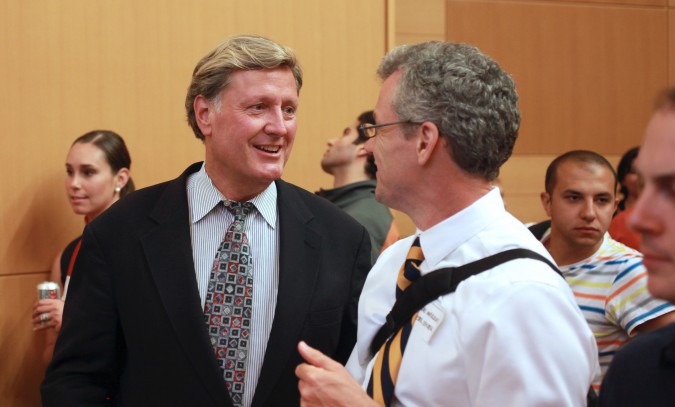
Jeff-Burton, left, the brand new Executive Director of the UC Berkeley Skydeck talks with Andre Marquis, Executive Director of The Lester Center for Entrepreneurship & Innovation, August 30, 2012. Photo by Kevin Warnock.
I upload pictures to this blog at the maximum resolution my camera produces — 21 megapixels. Click on them twice in delayed succession to see them at full size. I shot these pictures at ISO 4,000 due to the low lighting levels.
Click here to see all the posts I have written about the Berkeley Entrepreneurs Forum.
The law firm Fenwick & West LLP where Sam Angus is a partner produced and gave away a great 80 page booklet at the Forum. Retired Fenwick attorney Jacqueline Daunt wrote a fantastic introduction to startups that includes a capitalization table for a hypothetical company from pre-funding stage through a public stock offering. Thank you Fenwick! If I can post this booklet, please let me know and I’ll update this post with a link to a PDF scan of the booklet.
Finally, as an end note, I met Steve Bengston in 1999 during the first dot com boom, when he agreed to help me with Hotpaper, my startup at the time. It turned out I didn’t call on him much, since I lined up financing almost too easily, but I will never forget pitching him at his PriceWaterhouseCoopers office in San Jose, California USA, and him telling me at that meeting that he would help me. Bengston is well known, and I was thrilled to have his support, especially back then when I didn’t know many people or know much of anything.
Modify Watches retail launch party at Hangr 16 boutique in San Francisco, California USA, August 9, 2012
On Thursday, August 9, 2012 I attended the retail launch party for Modify Industries, Inc.
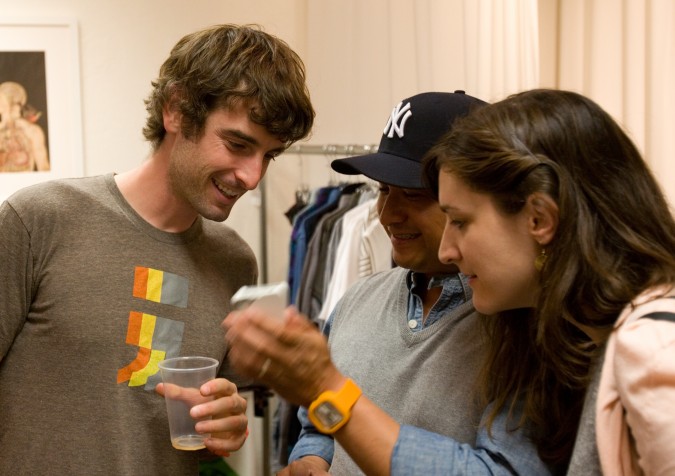
Aaron Schwartz, left, CEO of Modify Watches, checks out an Apple iPhone app August 9, 2012 at Hanger 16 at 3128 16th Street, San Francisco, California USA
Modify Industries is the company behind the colorful and fashionable silicone rubber Modify Watches brand watches that feature time pieces that without tools may be interchanged between bands. You can see people wearing Modify Watches in the top three photographs that illustrate this post. The watches come in two sizes. There are dozens of time pieces and dozens of straps (bands) to select from.
Modify Watches was a finalist competitor in the 2012 Berkeley Startup Competition at the University of California. That competition is very competitive, and it’s very difficult to become a finalist, as there are only eight per year, while most years more than 100 teams apply to compete.
I am friends with Modify CEO Aaron Schwartz.
Click here to see all my blog posts, past and future, that I have written about Modify Watches.
Modify has focused its attention on eCommerce sales and enterprise sales. It has achieved impressive success in both areas, selling to big companies including Google.
Now Modify is moving into retail by selling to boutique retailers.
One such boutique is Hangr 16 at 3128 16th Street in San Francisco, California USA, near Valencia Street. Hangr 16 carries the Modify line of products. The store’s energetic and charismatic buyer, Liddy Parlato, decided to sell Modify’s eye catching line after she opened an email targeted to her store from the company. Parlato told me she gets 30 pitches a day by email. Parlato’s store is spare and elegant, with a well curated selection. It’s not jammed with hundreds of product lines like many boutiques. Thus, Parlato’s decision to carry Modify’s products is a win for Schwartz and his team. Parlato is one of four owners of Hanger 16. She comes from a background in advertising, not retail.
While researching this blog post, I learned that Hangr 16 was voted the Best Clothing Store for Men by readers of the San Francisco Bay Guardian weekly newspaper. That makes the store’s decision to sell Modify Watches all the more special.

Modify Watches still life at Hanger 16 retail launch event August 9, 2012 at 3128 16th Street San Francisco, California USA
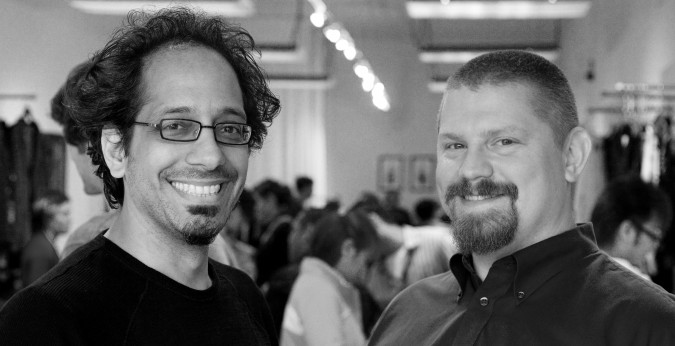
Abie Hadjitarkhani and Nathan Dintenfass, founders of Hotel Delta, at Modify Watches retail launch party, San Francisco, California USA, August 9, 2012
Abie Hadjitarkhani and Nathan Dintenfass attended the launch party. I know Dintenfass from the Haas School of Business at the University of California Berkeley. I met him while he was getting his Masters of Business Administration degree. I participate in many events at Haas to help the students and by extension The Lester Center for Entrepreneurship and Innovation.
Dintenfass and Hadjitarkhani run Hotel Delta, a boutique consultancy that helps entrepreneurs create great products.
Hotel Delta produces the Products are Hard conference.
Nathan Dintenfass is one of the smartest entrepreneurs I know. I have spent hours listening to him advise startups, and his wisdom is evident and deep.
Congratulations to Schwartz and his impressive team at Modify Industries. I predict great things to come.
I took the pictures that accompany this post. I uploaded them at full camera resolution of 21 megapixels. Click on them in delayed succession to see the full size versions, which are larger than your screen.
Legal disclosure — Schwartz let me borrow six of his company’s watches so that I may photograph them being worn by the female models I photograph. I pursue photography as a hobby, and do not charge for my work, so perhaps this disclosure is not legally required. To cover my bases, I am disclosing this loan. I proposed this arrangement, not Schwartz. I would have written this post even if Schwartz did not let me borrow any watches. I will return the watches to Schwartz once I photograph them with some additional models.
Berkeley Startup Competition finalists, including Back to the Roots and Modify, are announced
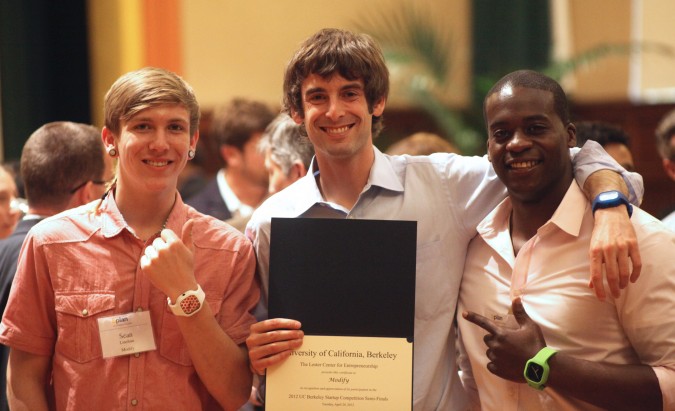 HARBO Technologies
HARBO TechnologiesSean Linehan, Aaron Schwartz and Ayo Oluwole of Modify, April 24, 2012. Modify is a finalist in the 2012 Berkeley Startup Competition.
Last night, on April 24, 2012, I attended a reception at the University of California Berkeley Clark Kerr Campus. The reception was held to announce the finalists for the 2012 Berkeley Startup Competition. This event used to be called the Berkeley Business Plan Competition. I competed in the finals of this competition in its inaugural year, and have sponsored the competition every year since, including in 2012.
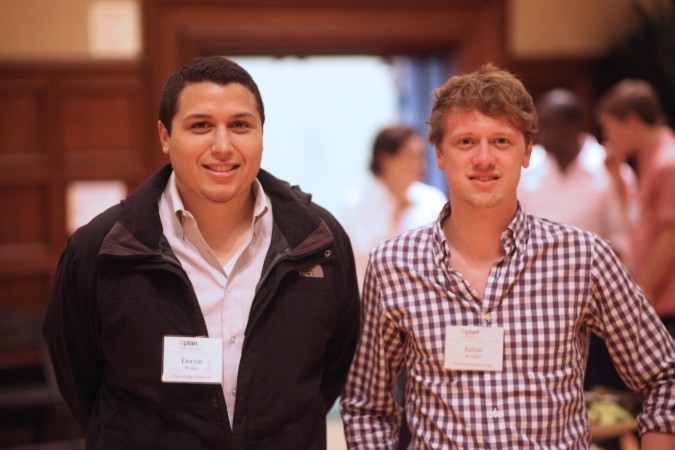
Dorian Walder and Julian Riediger of University Gateway, April 24, 2012. Kevin Warnock mentored this team this year.
This year I was a mentor to semi-finalist team University Gateway, lead by Dorian Walden. I got to know Walden over four meetings, some of them stretching to 3 hours around my dining room table. Sadly, University Gateway did not progress to the finals, but it was easy for Walden to understand why.
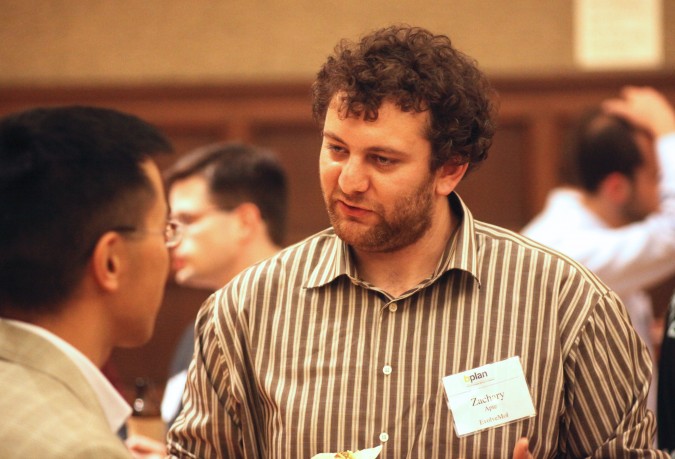
Zachary Apte of EvolveMol, April 24, 2012. Apte is at the Berkeley Startup Competition finalists announcement reception.
Two teams I know personally were in the same judging category as University Gateway — Products and Services. University Gateway is an Internet company, but the track for Internet companies apparently was filled up already. This meant University Gateway was competing with companies that make and sell physical goods.
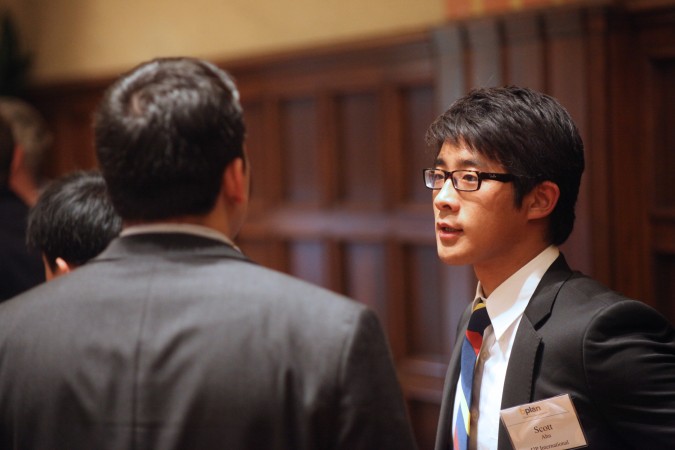
Scott Ahn of J2P International, April 24 2012. Ahn is at the Berkeley Startup Competition finalists announcement reception.
The teams I know that competed in the Products and Services track both were advanced to the finals. I was 99.9% confident that this would be the result, even though I knew nothing about the other competing teams. I was so confident because the teams I know are so strong, and I have been a judge for this competition for the past 8 years or so. I know from experience that teams this strong always make it to the finals.
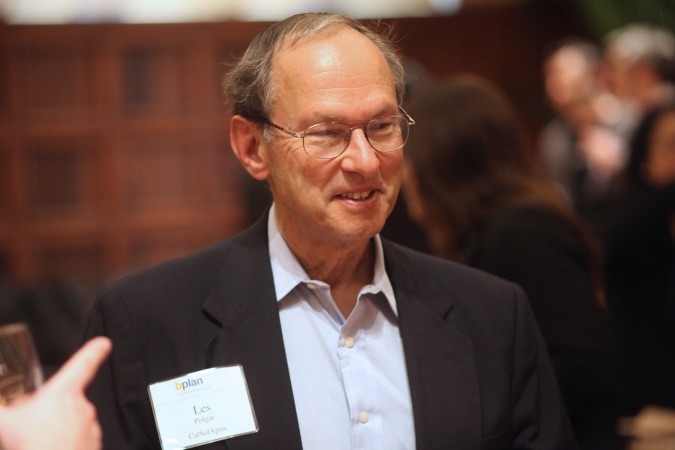
Les Polgar of CalSolAgua, April 24, 2012. Polgar is at the Berkeley Startup Competition finalists announcement reception.
I also know that teams this strong are very rare, so it was unlikely that the Products and Services track had any other teams so strong. I have never gone home from judging thinking that a third team from my judging track should have gone on to the finals.
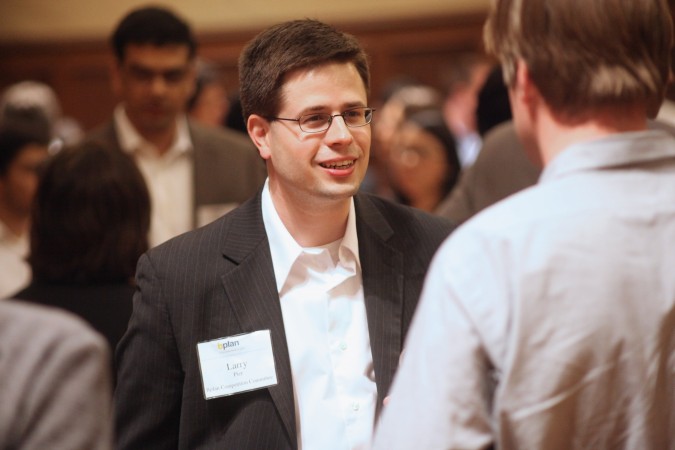
Larry Pier of Berkeley Startup Competition, April 24 2012. Pier is at the Berkeley Startup Competition finalists announcement reception.
University Gateway has a good idea, and I hope that Dorian Walder and Julian Riediger make their venture a success. The company is still in stealth mode, so I won’t tell you what they do yet.
The Products and Services teams that advanced to the finals are Modify and Back to the Roots. Both are unusual companies for this Berkeley competition.
Modify makes wrist watches that you can change easily to suit your tastes. The straps are made from silicone, similar to what silicone bake ware is made from. One can pop the time piece out of the strap/case in just a second, with no tools or special skills required. The straps are available in bright colors, and I describe them as chunky chic. The team from Modify are each wearing a Modfiy watch in the photograph I took at the top of this post. I am friends with Modify founder Aaron Schwartz. We see each other most months at the Haas Founders group I wrote about March 11, 2012.
Schwartz is a likeable and modest guy — only when researching this blog post did I discover he’s been profiled in a blog published by The New York Times newspaper. The New York Times is worth tens of millions of dollars less than photo sharing smart phone application Instagram, but I’d much prefer to be written about in a blog by The New York Times than in a blog by Instagram.
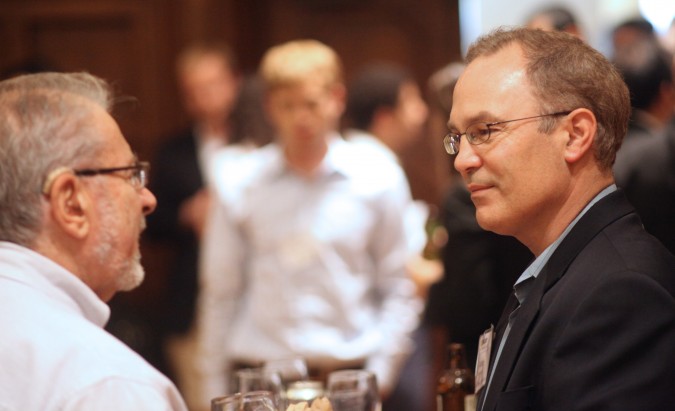
John Steuart of Claremont Creek Ventures, April 24, 2012. Steuart is a judge for the Berkeley Startup Competition.
Back to the Roots makes and sells affordable oyster mushroom growing kits. I’ve written about Back to the Roots when I saw their CEO Nikhil Arora speak on a panel at a Food Startups Meetup run by my friend Matthew Wise, the co-founder of both Founderly and Tableslice. Back to the Roots has 20 full time employees, or so I was told when I interviewed a staff member at their booth at the San Francisco Flower and Garden Show on March 24, 2012.
Back to the Roots has received lots of press coverage, including two minutes and forty seconds on the national CBS Evening News in the United States on March 15, 2012. The newscast says that Back to the Roots sells its products in over 1,000 stores and has 28 employees. Impressive.
Both Modify and Back to the Roots have businesses that are well along. Modify has sold _____ of thousands of watches to companies as well known as _____ and _____. [I’m waiting to hear from Schwartz to fill in the blanks in the last sentence. I know the values, but I want to verify the numbers and names I know are meant to be public information.] Back to the Roots sells its kits at Whole Foods Market and Home Depot. While Modfiy and Back to the Roots are still startups, they are making big strides and are companies to watch.
The reception was well attended and busy. I got to talk with my fellow judges from past years of this competition. I captured video. I took hundreds of pictures. I didn’t eat until the event was technically over. What I didn’t get to do, sadly, was interview the finalist teams that I didn’t know. If they are reading this and would like to be the subject of a future blog post, I invite them to contact me. I’ll meet you for coffee and you can give me your pitch and I’ll write about your venture.
Here is a list of the 2012 finalists for the Berkeley Startup Competition. The descriptive text that follows was provided by the teams themselves.
- Kloudless, Inc.
Kloudless is a free service that helps you manage all the things you put in the cloud. We enable users to search for, access, and manage their information that is spread across the Internet. We’re starting with email attachments, the black hole of cloud services, and will expand to other cloud services in the near future. Our solution addresses an increasingly large problem as more and more information moves into the cloud.
- Traverie
Traverie is an explorer focused startup that leverages the emotional, personal and inherently social aspects of travel discovery to make the process visual, fun and trustworthy. We bring structure to the current ad hoc and offline model of discovering and selecting destinations. We blend user-generated content, professional content and advertising to deliver a compelling user experience. Our founding team comprises a designer, engineer and product manager from MIT, Harvard and Berkeley-Haas, respectively.
- AdrenaRx
AdrenaRx is a biopharmaceutical company focused on the prevention and treatment of heart failure due to toxicity from cancer chemotherapy. Each year, 1.6 million Americans are affected by cancer, and a third of these patients receive chemotherapy that can damage their heart. AdrenaRx has identified a new therapeutic target and a potent, selective drug that can protect the heart from damage by chemotherapy, and reduce a patient’s risk of developing heart failure after surviving cancer.
- Calcula Technologies
Calcula Technologies is developing a novel urological medical device for the removal of kidney stones outside of the operating room. Our patent pending technology will treat 4M patients/year in the US and EU. With clear FDA predicates and existing CPT reimbursement codes Calcula will be a major disruption in the field of Urology.
- Claro Energy
Claro Energy provides solar-powered water pumping solutions to meet irrigation needs of farmers in remote power-deficit agriculture areas in India where costly diesel generated power is the default choice. Claro Energy’s solar-powered pumps have near zero operating costs, are longer lasting and highly reliable when compared to dieselpowered pumps. In combination with sales, marketing and business development competencies, Claro Energy has also developed in-house integration and implementation expertise in remote rural regions of India.
- HARBO Technologies
During the first critical hours, oil-spills spread, split, and create escalating irreversible damage. HARBO develops the only emergency oil-spill containment solution for immediate response. HARBO’s Zero Time to Spill system is at standby position on-board oil-tankers/rigs and other ships and deploys a boom (floating barrier) within minutes to contain spills. HARBO’s advantage: Minimizing environmental damage, avoiding large containment/cleanup expenses, offering superb costefficiency and preventing a PR nightmare. “Containing oil-spills when they’re small, preventing big disasters.”
- Back to the Roots
Back to the Roots, started by two Haas Business School undergrads, promotes sustainability and zero-waste, while reconnecting people to food through its grow-at-home mushroom kit. Our gourmet mushroom kits are made with 100% recycled coffee grounds, and produce 2 pounds of fresh oyster mushrooms in just 10 days! People of all ages can actually grow and eat their own mushrooms all at home, a unique experience in today’s urban lifestyle.
- Modify
Modify is a brand built on freedom of expression. Customizable for individual style, Modify’s interchangeable watches offer dope design for anyday wear. Available in two different sizes and over 250 combinations, Modify is a brand made for anyone—anytime, anyplace. A proponent of exceptional personalized service, we engage organizations and fans to help create (and name!) watches. Modify Watches are available for corporate gifting and licensing.
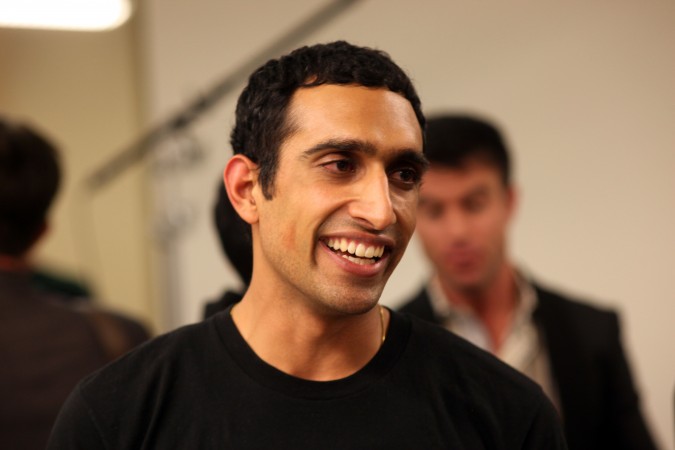
Nikhil Arora, the CEO of Back to the Roots. This was taken by Kevin Warnock on November 16, 2011, not at the Berkeley Startup Competition event.
Here’s the handheld video I captured of the finalist teams learning of their advancement and collecting their certificates documenting their achievements. Andre Marquis, the Executive Director of The Lester Center for Entrepreneurship & Innovation, delivers the opening remarks. John Steuart, Managing Director at Claremont Creek Ventures, comments on the judging process. Steuart’s firm is a financial sponsor of the competition, and Steuart is one of the judges.
—–
Anthony Franco of Better Cater, pictured above, contacted me and asked me to link to his startup’s website. Sorry for the delay in creating the link — I just saw your Facebook message from April 25th a few minutes ago. Kevin — May 3, 2012 @ 12:47am.
